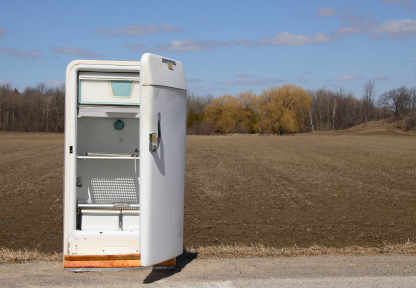Are you already preparing for spring cleaning? Are you looking for the perfect way to get rid of large and small appliances? Rather than throwing out microwaves, coffeemakers, toasters, ovens and refrigerators, you really should recycle these “brown and white goods.”
 To some, recycling just seems tedious. It can also seem easier to throw items in the trash — especially large electrical items. However, a variety of countries, states and cities have implemented recycling programs and laws to not only encourage the importance of recycling, but also to benefit the planet.
For example, let’s take a look at refrigerators. The recycling process of refrigerators can be quite complicated, but is extremely beneficial to the environment.
Thanks to Energy Star, JACO Environmental (a facility that recycles household appliances) and one of JACO’s partners, the Omaha Public Power District, here is a breakdown of the refrigerator recycling process:
To some, recycling just seems tedious. It can also seem easier to throw items in the trash — especially large electrical items. However, a variety of countries, states and cities have implemented recycling programs and laws to not only encourage the importance of recycling, but also to benefit the planet.
For example, let’s take a look at refrigerators. The recycling process of refrigerators can be quite complicated, but is extremely beneficial to the environment.
Thanks to Energy Star, JACO Environmental (a facility that recycles household appliances) and one of JACO’s partners, the Omaha Public Power District, here is a breakdown of the refrigerator recycling process:
- The refrigerator unit is cataloged by recording the unit number and utility information.
- A core sample is conducted by drilling a 1-inch hole on the unit’s side to detect the type of insulation present (most likely foam).
- The Freon, a liquid or gaseous fluorocarbon used as a refrigerant, is removed, along with the oils from the compressor. These oils are usually heated to distill the refrigerant, which is then shipped to a qualified facility that will handle with care. Such oils can be reused in some industrial equipment.
- Next, the capacitors that are suspected of containing PCBs are removed and shipped for destruction by a registered hazardous waste incinerator.
- The interior shelves, drawers and storage containers are removed. These are then harvested for tempered glass, plastic and metal.
- The chassis, or frame, is cut into pieces. The metal, plastic and foam are harvested and separated.
- The foam is sealed inside bags, and then shipped off to an incinerator.